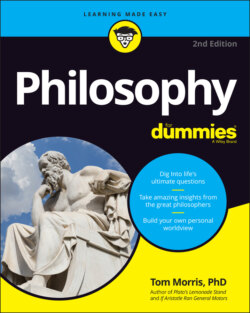Читать книгу Philosophy For Dummies - Tom Morris - Страница 44
Truth and rationality
ОглавлениеWe live in a world of wildly irrational beliefs. People seem to believe all sorts of crazy things. If you ever venture into the darker corners of the web or onto the strangest social media feeds of our time and actually read what is said there, you may find yourself astonished. If you venture out from your comfort zone and expose yourself to some of the more outlandish claims people make these days, you quickly realize that they don’t appear to be doing it as a joke. There seems to be no limit to what some people can believe, or seek to spread online for others to believe. The various social media in our time have proved that beyond any doubt, in case you ever had any doubt. In fact, it has often been observed that there is a strong tendency in human life for people to believe whatever they want to believe, whether those beliefs are even remotely rational, or justified, or not.
Here is the problem. Irrational belief is belief without a reliable tie to truth. So, irrational belief can be dangerous. Our natural tendency to believe is like our natural tendency to eat or drink. Not everything you come across that looks safe to eat is indeed safe to eat. Not every liquid you find is safe to drink. Likewise, not every proposition that comes your way that can look like it may possibly be true is safe to believe. Your eating and drinking should be subject to the guidance of your well-founded beliefs. So should everything else in your life. And that is even more reason for your beliefs to be subject to the careful scrutiny of reason.
You should want to be reasonable in your beliefs because, when used well, reason can connect you more reliably to truth. It’s then important to value rationality as a road to truth, and thus to knowledge. But that means you need to know what reason is. You need to understand something about rationality and why you should value it in your ongoing quest for truth in the world.
The prominent twentieth century philosopher Bertrand Russell wrote: “The mind is a strange machine which can combine the materials offered it in the most astonishing ways.” That comment applies well to imagination, but also to reason. Reason is just the power you have to organize and interpret the materials of your experience in the world (what you see, hear, touch, taste, smell, or sense in any other way), as well as the ability to draw reliable conclusions that move beyond the confines of immediate experience. It’s also the power to govern your actions, emotions, desires, and expectations in such a way that they will make sense, given all the realities with which you have to do.
Solon, an Athenian statesman, warned that people should “Be led by reason.” At some point, you may have told someone “Please be reasonable” when their actions, attitudes, emotions, expectations, or beliefs are out of line with what you thought the realities of their situation were. When you say such a thing, you typically want the unreasonable person to come into line with whatever the evidence is that would indicate a better course of action, emotion, or thought, or a more rational conclusion than what that person has chosen, or drifted into instead. Reason used well is able to better connect us with reality, and thus better guide us into the future.
Reason is of great importance in life. But it is neither as extensive nor as pure as some philosophers of the past have assumed. What we are able to perceive, how we organize our perceptions, and what we conclude from our experience is often as much a result of nonrational feelings and attitudes as it is of rational rules and constraints. That’s why it can be hard to reason someone out of a false belief they enjoy holding or feel a need to embrace.
